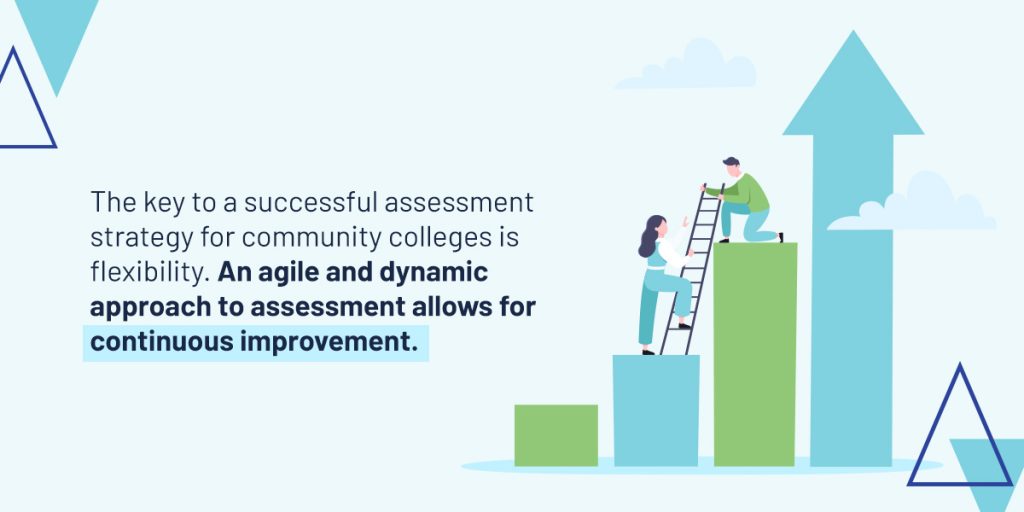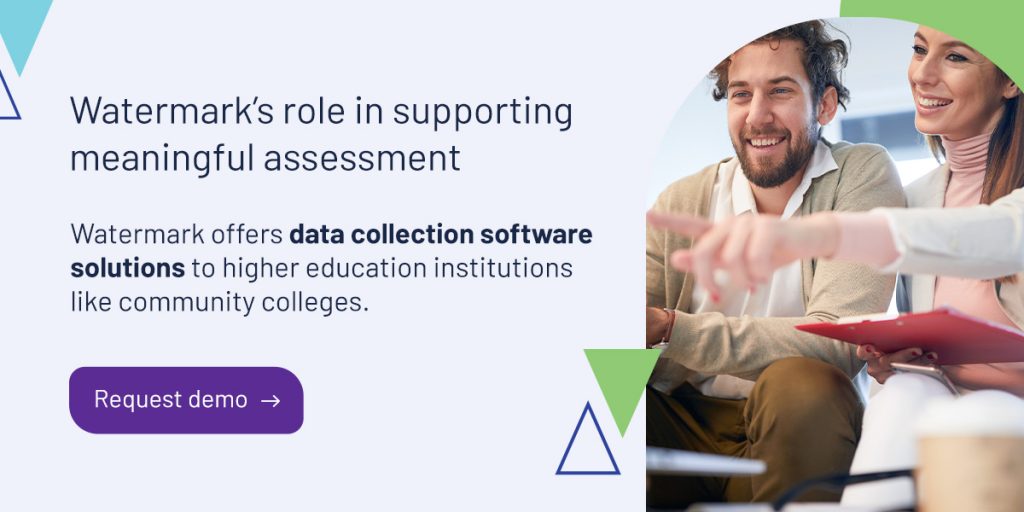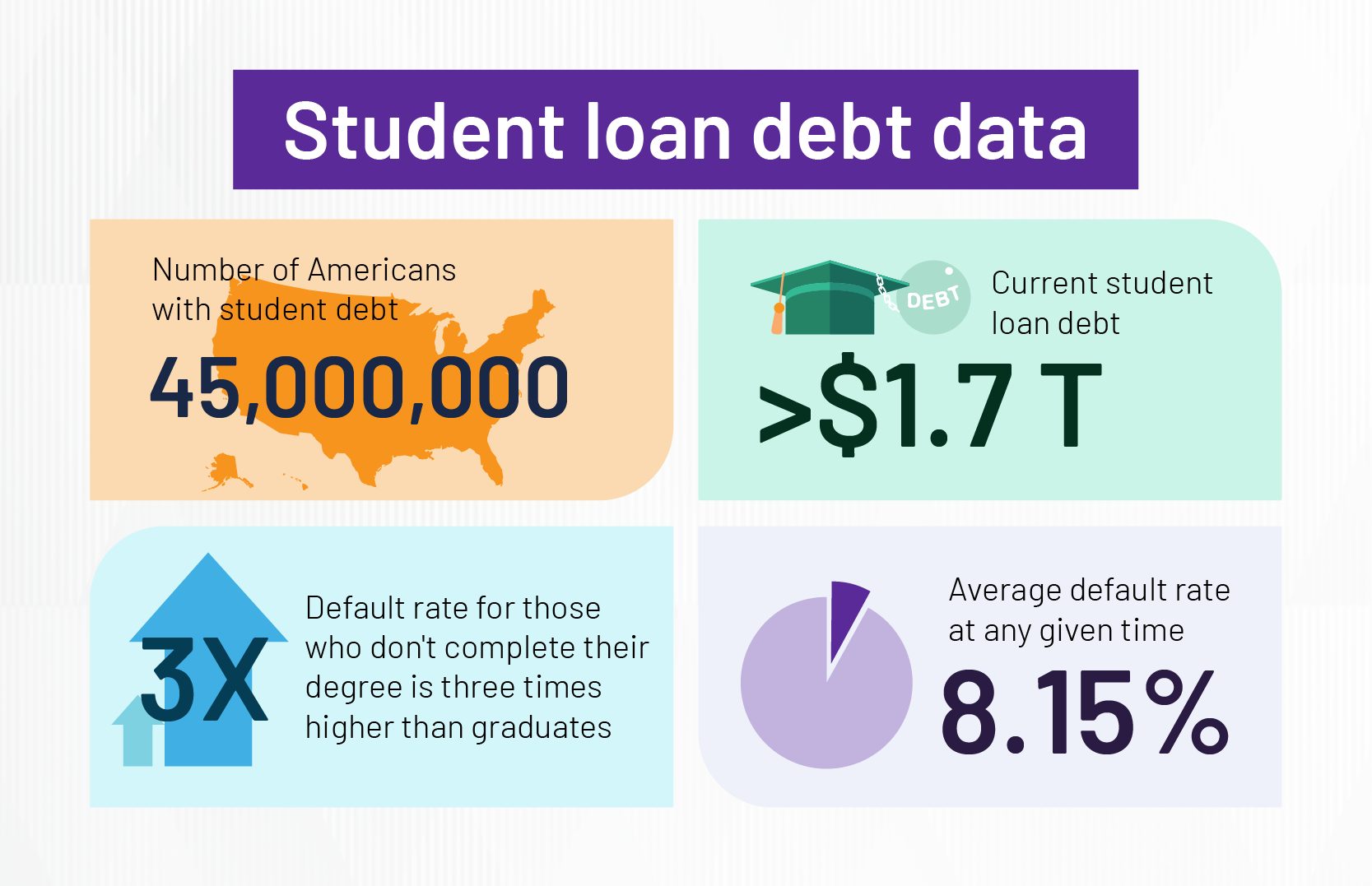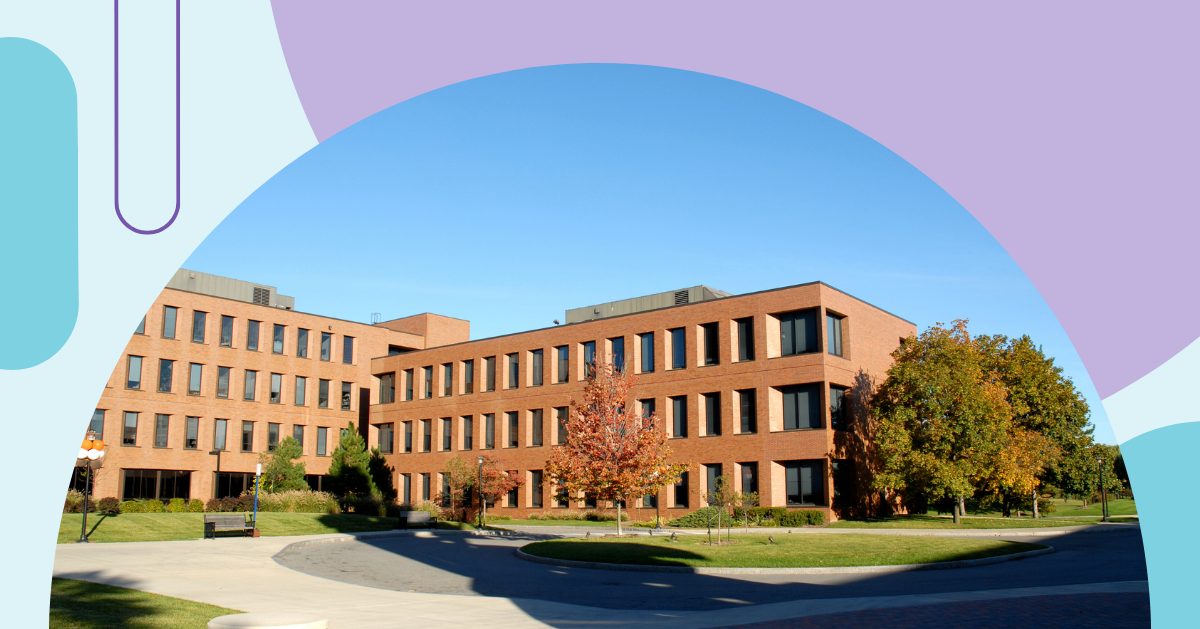
Community colleges face several unique assessment challenges. In recent years, it has become increasingly clear that these institutions play an invaluable role in higher education, and in society at large. However, they’re under considerable pressure to link student outcomes to workplace skills, meet enrollment goals, and retain students who face their own personal challenges.
A fresh perspective on assessment is essential for community colleges to produce strong learning outcomes and drive program completions. Watermark and the National Institute for Learning Outcomes Assessment (NILOA) coordinated a panel discussion that offered a look at how top leaders at several community colleges continually evolve their assessment processes. Consider these strategies for your institution.
What makes assessment at community colleges unique?
Community colleges have more flexibility in how their general education classes are designed and also offer different educational paths, like certifications, workforce training, and associate degrees. This variety makes assessment more complicated. “We have about 39 transfer programs that run the gamut — industrial, medical, and culinary arts. Finding ways to assess those programs, which have a lot of high-contact hours, can be challenging,” says Jill Millard, Associate Vice President of Planning and Institutional Effectiveness at South Piedmont Community College.
Smaller class sizes can also pose a planning issue. “We cannot assess on a yearly basis because we might only have four or five graduates in any given program, so it puts a new spin on assessment and makes us really think about how we can assess our programs and our student progress,” states Kathy Adair, Director of Development & Assessment and Social Science Department Chair at Bay Mills Community College.
Assessment for adjunct faculty
Many educators at community colleges are adjunct faculty teaching as a second job, so they have less time for administrative tasks like creating in-depth assessment plans. To simplify the concept of assessment, it’s helpful to tie it back to their other job.
“One way I like to connect with adjuncts is to remind them that they’ve been assessing at their workplace already — they just didn’t call it that. So if you were evaluating employees, what does the occupation require? You can connect that to the program, and then kind of teach them the concept of assessment from there,” Millard states.
Jacob Ashby, Assistant Dean for Assessment and Articulation at Frederick Community College, suggests the following resources to help support adjunct faculty:
- Assigning full-time faculty liaisons in each department as champions to support adjunct faculty
- Holding adjunct faculty nights each semester for assessment-related training
- Scheduling open labs each semester where adjunct faculty can come in and enter data
- Creating an online resource page with useful information for adjunct faculty
- Sending personalized emails with helpful information on submitting data for specific courses
Assessment challenges at community colleges
Community colleges have unique challenges when it comes to assessment, from efficiently gathering information from adjunct faculty to managing assessment strategy and reporting for nontraditional programs.
Adding to the complexity, community colleges and associate degree-granting institutions are more likely than all other schools to use placement exams, employer feedback, and local surveys. When schools use assessment results for external accountability and external funding, the pressure increases. Some of the most prevalent assessment challenges at community colleges include:
- Diverse student populations: Community college students vary in preparedness and learning styles. Nontraditional students make up almost 75 percent of the student population. Community colleges need flexible assessment methods to ensure accurate and unbiased evaluations of students from diverse backgrounds.
- Resource and implementation barriers: Many community colleges have limited funds and resources for comprehensive assessment implementation. Faculty are under time constraints to implement traditional assessments and may face limited opportunities for training in the latest assessment best practices.
- Student participation and engagement: Most community college students have full-time jobs and families, some of the many reasons for high attrition rates. When students face challenges with work-life balance, they may not participate in voluntary assessments.
- Assessment quality and relevance: Student outcomes at community colleges are unique, and many students want practical evidence of the skills they learn in their courses. While some assessments are relatively easy to institute, it can be challenging to maintain consistency across courses. Making assessments relevant to technical and soft skills, connecting them to real-world skills, and incorporating workplace competencies can be challenging.
- Data collection and analysis: Many community colleges use multiple data collection systems, which leads to inconsistent data formats and siloed data. Without cohesive and high-quality data, getting the full picture or knowing where to allocate resources for improved student outcomes is immensely challenging.
- External pressures: Many community colleges are under pressure to meet accreditation standards and state and federal reporting requirements. In addition, there’s pressure to maintain enrollment numbers, which makes demonstrating program effectiveness even more critical to success.
These challenges are often interconnected, creating a complex web of issues that your community college must navigate to improve student learning outcomes. Addressing these challenges with a systematic approach to assessment planning can go a long way in creating a positive assessment landscape. Focus on flexible and adaptive assessment strategies that leverage continuous evaluation and adjustment to ensure a streamlined and representative assessment process.
Tips for assessment success at community and technical colleges

Because each student enrolls with a different goal in mind, the key to a successful assessment strategy for community colleges is flexibility. An agile and dynamic approach to assessment allows for continuous improvement. You can adapt courses, general education, and program assessment to align with changing student expectations and how students move through the curriculum.
Here’s how to make it happen:
1. Focus on student learning
Assessment data collection should be focused on continuous improvement, with student learning and engagement at the center of it all. Set specific goals around improvement and work backward to define how those goals will be met. Only collect data that ties back to these goals, and know what you will do with the numbers once you have them. This ensures that the time and energy spent on assessment is truly valuable, which makes it easier to get faculty on board.
2. Tie assessment back to the real world
It’s often difficult to keep adjunct faculty engaged in the assessment process, particularly when they’re working a full-time job in addition to their teaching load. However, private industry faculty are already familiar with the concept of assessment in their other job — if they’re evaluating employees and providing feedback on their performance, that’s assessment. Encourage them to ask, “What does the job require?” and “What defines a good employee?” By connecting these ideas back to the program, they can more easily define learning outcomes.
Curriculum mapping is another essential tool in aligning course content with student learning outcomes. With an effective curriculum map, you can create student roadmaps to success beyond community college, planning an effective sequence for instruction that directly connects courses in the real world. When you map outcomes to courses, you can define how to assess student progress on the way.
3. Use what you have
When you start to design an assessment, start with what you’re already measuring and identify any gaps that need to be filled in. Then, adjust the measurement process or add new questions to capture any missing details. For example, you can use the indirect measures you’re gathering in regular course evaluations and general surveys to uncover students’ perceptions of their performance or program efficacy. However, you may need to add new survey questions to gather more insights into a specific learning outcome.
4. Get the right tools
You’re likely already collecting data in a variety of systems but are left with a broad range of information about how students are performing and how they feel about the coursework. By using integrated assessment and course evaluation solutions, you can take advantage of automated workflows that keep the process moving and access unified reports that bring both types of measurement together.
Higher ed is continuously changing, and many community colleges are seeing increased enrollment as a result. Now is the time to review your assessment strategy to make sure it’s keeping pace.
How to overcome assessment challenges
Because community college assessment is so unique compared to other higher education institutions, implementing the right strategies can help you overcome challenges before they occur. When you can make the most of your college assessment, you can better serve your student body and implement significant improvements across campus that help you attract and maintain students. Some ways to overcome assessment challenges include:
- Unifying objectives: Community colleges are gathering places for many types of students with various goals. Additionally, faculty and departments might have unique objectives they are measuring during assessment periods. With so many interests and goals, you can prevent jumbled, confusing data by creating assessment campaigns measuring one unified outcome. You can better understand goals across departments and student populations when everyone is on the same page.
- Specifying assessment subjects: Generalized information might give little insight into your community college’s performance and desired outcomes. In these instances, you can specify your measurements to receive more detailed and helpful data. For example, instead of looking at overall student learning outcomes, you might target specific groups, like dual-enrollment or transfer students, to see how your programs benefit and support their needs. You can use this data to make meaningful and powerful changes on campus.
- Considering factors outside learning objectives: Many schools get lost in learning outcomes, but community colleges must measure other factors in assessment periods to remain competitive. Your campus competes with other local community colleges, in-state colleges, and out-of-state education options. Assessing other selling points can ensure you provide for student needs with strong programs and faculty support. Some factors might include assessing technical programs, post-graduate opportunities and outcomes, and student-professor ratios.
- Identifying student needs: When looking for ways to improve your campus and understand its functionality, you can look at various student needs. Students are often vocal about what they would like to see improved on campus and in the classroom, making them valuable sources of data and information. Starting your assessment processes with student input can help you better identify other areas on campus to assess and collect data.
- Centralizing systems: Collecting data from multiple sources, like departments or faculty members, can quickly cause confusion and disorganization. How you store your data can increase accuracy and comprehension. Multiple spreadsheets can create multiple versions of the same dataset stored on different devices. Instead, implementing a centralized database can ensure everyone is looking at the most recent and accurate information. Cloud-based systems can increase accessibility, allowing professors and administrators to view data from more devices.
- Gathering student feedback: One of the core elements of successful assessment at community college is supporting each student’s unique journey. Encourage students to offer course feedback and provide faculty and administration with the results so that your entire institution can improve its assessment practices.
Having strong and effective assessment services and systems can reduce challenges for community colleges. When your assessment processes are essential for determining your school’s performance and improvement initiatives, you can make more of your efforts by understanding the challenges community colleges face and trying to avoid them.
Watermark’s role in supporting meaningful assessment
All of the panelists agreed that technology plays an essential role in supporting meaningful assessment at their institutions.
“The Higher Learning Commission (HLC) was pretty impressed with the role of technology and the reports that we’re able to present to them for continuous improvement within our courses and our programs. It’s just been great, and I don’t want to go back to binders,” said Adair.
When searching for the right technology to support the assessment process, Watermark offers data collection software solutions to higher education institutions like community colleges. Because we understand the unique needs community colleges face annually, we design our solutions with features targeted to higher ed institutions and their desired outcomes. Our assessments projects solution uses a rubric-based system to help colleges organize their assessments and better understand your data.
To learn more about how to improve assessment processes at your community college, watch the Assessment success strategies for community colleges panel discussion. Request a demo today to get started on effectively measuring your assessment data.
















































































































































































































































































































































































































